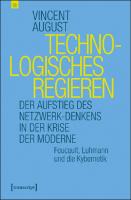Technologisches Regieren
Der Aufstieg des Netzwerk-Denkens in der Krise der Moderne. Foucault, Luhmann und die Kybernetik
Abstract
Das Netzwerk ist ein Grundbegriff des 21. Jahrhunderts geworden - und mit ihm die Diagnose, dass wir in einem neuen Zeitalter leben, in dem es auf Konnektivität, Flexibilität und Selbstorganisation ankommt. In einer groß angelegten Geschichte des Regierungsdenkens zeichnet Vincent August erstmals diese fundamentale Transformation nach. Er zeigt, dass unsere Welt keineswegs nur durch den Neoliberalismus geprägt wird - und dass die Netzwerk-Gesellschaft nicht einfach ein Resultat des Internets oder von Computern ist. Vielmehr griffen Berater:innen und Intellektuelle wie Foucault, Crozier oder Luhmann auf die Kybernetik zurück, um die Ideenwelt der Souveränität abzulösen und unser Regierungsdenken grundlegend zu verändern. Eine Analyse spätmoderner Gesellschaften kommt ohne eine Analyse dieses Netzwerk-Paradigmas nicht aus.
Keywords
Netzwerke; Kybernetik; Souveränität; Neoliberalismus; Regierungsmodelle; Ideengeschichte; Michel Foucault; Niklas Luhmann; Michel Crozier; Spätmoderne; Strukturwandel; Steuerung; Transformation; Politik; Wissenssoziologie; Politische Theorie; Network Governance; Digitalisierung; Gesellschaft; Soziologische Theorie; Systemtheorie; Politische Soziologie; Demokratie; Soziologie; Networks; Cybernetics; Neoliberalism; Government Models; History of Ideas; Postmodernity; Structural Change; Control System; Politics; Sociology of Knowledge; Political Theory; Digitalization; Society; Sociological Theory; Systems Theory; Political Sociology; Democracy; SociologyDOI
10.14361/9783839455975ISBN
9783839455975, 9783837655971, 9783839455975Publisher
transcript VerlagPublisher website
https://www.transcript-verlag.de/Publication date and place
Bielefeld, 2021Imprint
transcript VerlagSeries
Edition transcript, 8Classification
Social theory
Social theory


 Download
Download